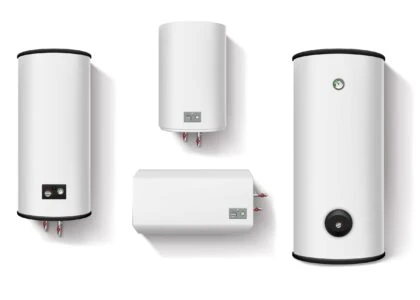The kitchen sink is a workhorse in any household—handling meal prep, clean-up, and everything in between. But when it clogs, your entire routine can grind to a halt. At Home Team Plumbing, we’ve seen firsthand how frustrating and inconvenient a clogged kitchen sink can be. Luckily, a little preventive care can go a long way. Here are our expert tips to help you keep your kitchen sink running smoothly and clog-free.
What Causes a Clogged Kitchen Sink?
Understanding the common culprits behind a clogged kitchen sink is the first step toward prevention:
Grease and Oils: These may seem harmless when hot, but they solidify as they cool, coating pipe walls and trapping debris—leading to serious buildup over time.
Food Scraps and Coffee Grounds: Even with a garbage disposal, things like coffee grounds, pasta, rice, and fibrous veggies can cause trouble. They tend to accumulate and form dense clogs.
Soap Scum and Residue: Traditional soaps can create a filmy buildup—especially when combined with hard water minerals—gradually narrowing your pipes.
Foreign Objects: Items like small utensils, sponge pieces, or even produce stickers can accidentally fall in and block the drain.
Daily Habits to Prevent a Clogged Kitchen Sink Drain
Simple day-to-day practices can make a big difference:
- Dispose of Grease Properly: Pour grease into a heat-safe container, let it solidify, and toss it in the trash.
- Use a Drain Strainer: A mesh strainer traps food bits and debris—just empty it into the trash regularly.
- Run Hot Water After Each Use: A short flush of hot water helps wash away oils before they harden in the pipes.
- Avoid Problem Foods: Coffee grounds, eggshells, rice, pasta, and fibrous items like celery should always go in the trash, not the drain.
Weekly Sink Drain Maintenance Tips
Keep your sink drain in top shape with just a few minutes each week:
- Flush with Boiling Water: Pour a kettle of boiling water down the drain to melt and move lingering grease or soap scum.
- Use a Baking Soda and Vinegar Rinse: Combine ½ cup of baking soda with ½ cup of white vinegar. Let it fizz for 15 minutes, then rinse with hot water to freshen and clear minor buildup.
- Clean Your Drain Strainer: Wash it with soap and water weekly to ensure it stays effective and free of grime.
What Not to Put Down Your Sink Drain
Avoid these common clog-causing items:
- Oils and Fats: These solidify and trap debris.
- Fibrous Vegetables: Celery, corn husks, and similar items can wrap around disposal blades and clog pipes.
- Pasta and Rice: These expand with water and turn into sticky paste in your plumbing.
- Eggshells: These can mix with other waste to form dense blockages.
- Coffee Grounds: They don’t break down and easily build up inside pipes.
- Produce Stickers: Often overlooked, these tiny stickers can block filters and create sneaky clogs.
Pro Tip: Once a month, treat your kitchen drain to a deep clean using a mix of baking soda, vinegar, and boiling water. This natural combo breaks down buildup, neutralizes odors, and helps keep your pipes clear—no harsh chemicals needed or recommended! Harsh chemicals can erode your plumbing pipes and cause a bigger problem.
When to Call the Pros
While regular DIY maintenance can go a long way in keeping your plumbing in good shape, some warning signs shouldn’t be ignored. These issues often point to bigger problems that only a licensed plumber can handle effectively. Here’s when it’s time to bring in the professionals:
Persistent Slow Draining: If your sink, tub, or shower keeps draining slowly—even after you’ve tried plunging or using drain cleaners—it could be a sign of a serious blockage deep in your pipes. These clogs often require professional tools like a plumber’s snake or hydro-jetting to fully clear.
Gurgling Noises: Hearing strange gurgling sounds from your drains? That’s not just your pipes being quirky—it usually means there’s trapped air due to a blockage. This can signal developing issues in your drainage system or vent pipes. Ignoring it may lead to more severe plumbing failures down the line.
Recurring Clogs: If you’re constantly reaching for the plunger or drain cleaner, there’s likely an underlying problem that needs professional attention. Recurring clogs often point to buildup in your pipes or issues further down in your plumbing system that a surface fix just won’t solve.
Multiple Affected Drains: When more than one fixture is backing up—say your toilet and bathtub are both draining slowly—that’s a red flag for a blockage in your main sewer line. This kind of problem can quickly escalate and affect your entire home, so it’s important to act fast and get a licensed plumber on the job.
Contact Home Team Plumbers
Explore our blog for expert tips, practical advice, and insider know-how to keep your home’s plumbing in peak condition. Don’t wait for a minor issue to become a major headache—contact Home Team Plumbers or give us a call at 727-310-4111 for fast, reliable service you can trust.





